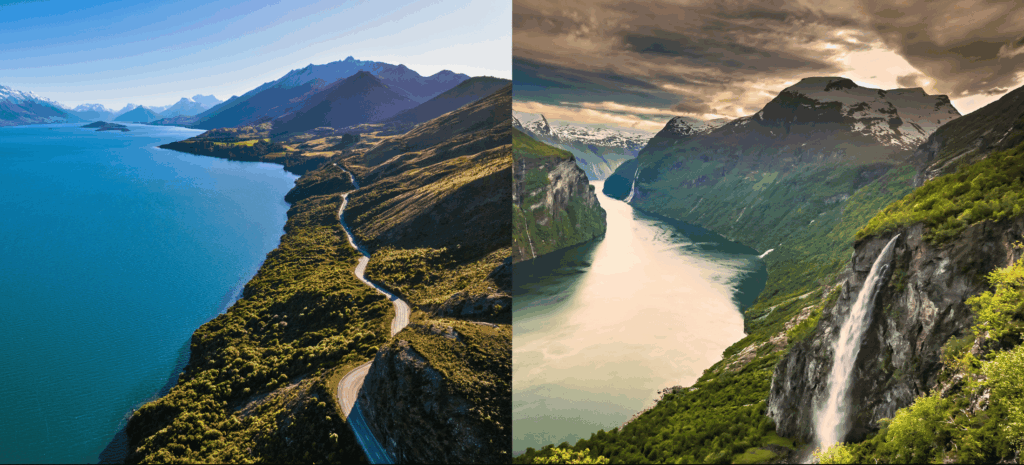
Introduction
As two nations known for their stunning landscapes and high quality of life, Norway and New Zealand often attract interest from travelers and international observers alike. Norway, located in Northern Europe, is renowned for its fjords and robust welfare state, while New Zealand, set in the southwestern Pacific, is celebrated for its natural beauty, including mountains and beaches. Understanding the key distinctions and similarities between these countries offers valuable insights into their cultural identities, governance, and lifestyle, making the comparison highly relevant in today’s global context.
Geography and Climate
Norway, known for its dramatic coastline and rugged terrain, experiences a cold maritime climate, characterized by cool summers and harsh winters, especially in the northern regions. Conversely, New Zealand boasts a temperate oceanic climate, fostering a diverse range of ecosystems from lush rainforests to arid regions. Although both countries offer remarkable scenery, Norway’s natural attractions, like the famous Geirangerfjord and Northern Lights, compete with New Zealand’s breathtaking landscapes, such as the Remarkables mountain range and the geothermal wonders of Rotorua.
Culture and Society
Culturally, Norway and New Zealand reflect their unique heritages. Norway’s history is steeped in Viking traditions, with a contemporary focus on social equality and progressive policies. The country ranks highly on global indices for happiness, education, and healthcare. In contrast, New Zealand is known for its indigenous Māori culture, which plays a vital role in its national identity, alongside its colonial history. The country’s commitment to multiculturalism is evident in its policies and societal norms.
Economics and Governance
Economically, Norway, rich in oil and natural resources, has established one of the highest GDP per capita rates in the world thanks to its sovereign wealth fund. Additionally, its governance model emphasizes social welfare and environmental sustainability. Meanwhile, New Zealand’s economy is more diversified, with agriculture, tourism, and services contributing significantly. It promotes a strong commitment to environmental protection and has been recognized for its legislative measures to combat climate change.
Conclusion
In conclusion, Norway and New Zealand, while differing in various aspects such as geography, climate, and culture, share common ground through their commitment to social welfare and environmental stewardship. The examination of these two remarkable countries provides not only a glimpse into their distinct identities but also a deeper understanding of how diverse societies can thrive in the modern world. As global challenges like climate change and inequality continue to escalate, analyzing successful models from Norway and New Zealand can offer valuable lessons for nations around the globe.



